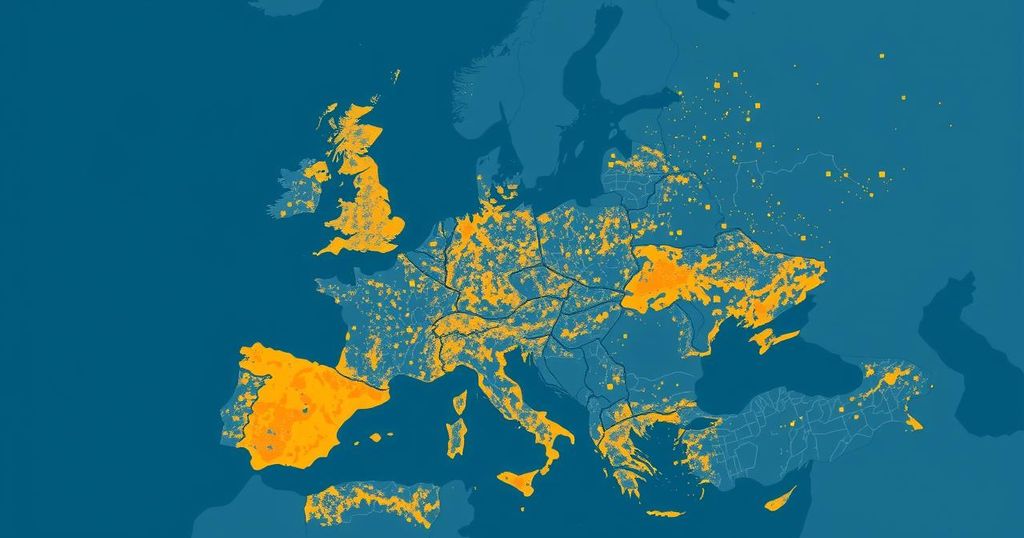The European Union’s Search for Countries to House Unwanted Migrants
The European Union is in discussions to potentially establish return hubs for unwanted migrants in countries like Uganda and Uzbekistan, following a summit where leaders endorsed new strategies for handling asylum claims. Amid rising anti-immigration trends across Europe, Poland’s Prime Minister and other leaders are advocating temporary measures to suspend asylum rights, causing concern over compliance with international laws regarding human rights. Italy’s new arrangement to process claims in Albania is facing challenges, and the effectiveness of these proposed policies remains in question as Europe seeks to manage the pressures of migration.
The European Union is actively seeking countries willing to accommodate unwanted migrants following the endorsement of “new ideas” concerning the handling of asylum seekers by its leaders. This initiative marks a significant shift towards strategies previously considered extreme, as the EU aims to establish “return hubs” akin to a now-abandoned British proposal to relocate ineffective asylum claimants to Rwanda. Additionally, there are discussions about relocating individuals who have been granted asylum to safe third-party nations. Poland’s Prime Minister, Donald Tusk, has gained implicit EU support for his scheme to temporarily suspend asylum rights due to increased border crossings from Belarus. European Commission President Ursula von der Leyen emphasized that nations need to enact “temporary and appropriate” measures in response to these migration challenges. The outcomes from a recent EU summit underscore the growing influence of anti-immigration movements across Europe, particularly after notable victories for hard-right parties in nations such as Austria, Germany, and the Netherlands. Despite the push for new policies, uncertainties linger regarding their practical implementation, especially concerning international laws against exposing individuals to conflict or mistreatment. Ms. von der Leyen has acknowledged that the establishment of return hubs for the deported individuals is complex, focusing on critical considerations, including the duration of detention. Although no specific country has been finalized as a destination, the Dutch administration has proposed Uganda, while Italy advocates for the repatriation of refugees to Syria. Furthermore, Germany has engaged in dialogue with Uzbekistan, which shares a border with Afghanistan, about welcoming deported refugees in return for more favorable conditions for migrant workers. The German Chancellor, Olaf Scholz, remains cautious about including North African nations like Tunisia, Morocco, and Algeria on a list of safe countries. Italy’s experimental arrangement to process asylum claims at a facility in Albania has encountered early challenges, as four of the initial sixteen migrants sent there were returned to Italy due to uncertainties regarding their ages and health. At an EU summit, it was resolved to pursue “determined action at all levels” to expedite the return of denied asylum seekers, highlighting the bloc’s commitment to enhancing deportations. Dutch Prime Minister Dick Schoof advocated for Uganda as a potential hub for migrants denied asylum in Europe, labeling it an innovative approach deserving consideration. The EU currently faces significant challenges, as merely one-fifth of migrants denied residence permits are being repatriated to their home nations, a situation being scrutinized within the framework of evolving migration policies.
The article discusses the European Union’s current efforts to address the ongoing challenges related to managing migration and asylum seekers. The EU is increasingly considering the establishment of return hubs in third countries for migrants denied asylum, focusing particularly on nations such as Uganda, Uzbekistan, and Albania. These negotiations are largely influenced by rising anti-immigration sentiments across member states, and the outcomes could significantly impact future asylum seekers’ rights and processing mechanisms. This move also reflects a broader strategic pivot by the EU to mitigate the pressures of irregular migration and streamline deportation processes.
In conclusion, the European Union is navigating a complex landscape concerning migration by exploring the establishment of return hubs in countries such as Uganda and Uzbekistan. The initiative highlights the pressing need to balance migration management with adherence to international law. As anti-immigration sentiment rises among member states, the efficacy of these proposed strategies remains uncertain. While the discussions reflect a shift in policy, it is critical that the rights of asylum seekers are preserved while addressing the logistical challenges posed by mass migrations.
Original Source: www.thenationalnews.com








Post Comment